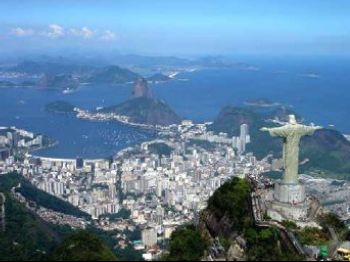
Physiology News Magazine
Physiology in Brazil: The Rhythms of Life: IUPS 2017 in Rio de Janeiro
The host of the next IUPS Congress provides an overview of the field in Brazil. The future looks bright for the field, but work remains to be done in this dynamic nation.
Features
Physiology in Brazil: The Rhythms of Life: IUPS 2017 in Rio de Janeiro
The host of the next IUPS Congress provides an overview of the field in Brazil. The future looks bright for the field, but work remains to be done in this dynamic nation.
Features
Benedito H Machado
University of São Paulo, Brazil President of the Brazilian Society of Physiology
https://doi.org/10.36866/pn.91.28

Rhythms of Life
The theme of the 38th IUPS Congress in Brazil is inspired by fundamental physiological processes, from cells to the function of whole biological systems, which are based on rhythms and cycles. Considering that the physiological sciences are dealing with the processes that determine life, the theme of the 38th IUPS Congress in Brazil will be ‘The Rhythms of Life’. This theme also combines the Brazilian culture and Brazilians’ lifestyle in which music, sports and a rich natural environment provide a perfect scenario for a real experience of ‘The Rhythms of Life’.
Achievements by our members
Integrative physiology is the hallmark of the scientific activity of several generations of physiologists in Brazil. Cardiovascular, neuroendocrine and metabolism, renal and neurophysiology were and remain the strongest sub-areas of physiology in Brazil and several important contributions in the second half of the 20th century have been made by members of the Brazilian Society of Physiology (SBFis) in these fields. In this historical context, several names have been important in establishing our current status on the international scene, such as Miguel R. Covian, Wilson T. Beraldo, César Timo-Iaria, Eduardo M. Krieger, Gerhald Malnic, Renato H. Migliorini, and José Antunes-Rodrigues among others Brazilians leaderships.
Challenges for research in physiology
Nowadays we have several strong graduate programmes in our universities and an amazing amount of interest from young people to get involved with science in general, and physiology in particular. PhD students can oobtain fellowships from the Brazilian federal agencies for graduate programmes and research development (CAPES and CNPQ, respectively) and there is quite reasonable financial support for young investigators to go abroad for their post-doctoral training (‘Science Without Borders’ by the federal government). In spite of all these efforts, the current number of Brazilians physiologists working in Brazil and playing an active role as leaders at the international level is still relatively small, and this is one of our main challenges for the next few years. We are aware that to be leaders in the international scientific community will require an increase in the impact of our scientific publications in order to reach levels similar to those achieved by physiologists working in developed countries, in which physiology is well established. This challenge implies that Brazilian physiologists must be more active in the international community of physiology, and we are convinced that some of these limitations will be overcome by several large scientific meetings in Brazil over the next few years, such as the 1st PanAmerican Congress of Physiological Sciences in 2014 and the 38th IUPS World Congress in 2017. The organization of these international meetings in Brazil will be an important contribution by the SBFis to making Brazilian physiologists significant players on the international scene.
At the national level it is really important to highlight that the SBFis hosts the Multicenter Graduate Program in Physiological Sciences, in which more than 120 students are enrolled in Masters and PhD courses. The Multicenter Program is a national network scheme with accreditation and financial support by CAPES (federal agency for graduate programmes) and it involves nine associated and six traditional graduate programmes in physiology in several regions of Brazil. With this programme, SBFis is contributing to increasing the number of faculties enrolled in graduate programmes and the number of PhDs in physiology in Brazil, and we are proud of such a great achievement by our Society.
Challenges for teaching physiology
Most PhDs in physiology in Brazil are working in the public university system, the institutions where most of the scientific activities in Brazil are developed, but the number of these highly qualified faculties is still relatively small for more than 120 public universities, and almost absent in the many private universities in Brazil. This implies that the majority of faculty members teaching physiology in Brazil are not PhDs and consequently their professional activities are not linked to any research in the physiological sciences. Therefore, we need to increase the number of PhDs in physiology in the next few years to teach and motivate a new generation of young talented students to get involved with research in physiology.

What is unique about physiology in Brazil?
There is high motivation amongst young students to get involved with physiology during their undergraduate courses, and in our annual congresses of physiology more than 70% of the attendees are graduate or undergraduate students. This is something unique and our Society and the Brazilian agencies for promoting graduate programmes and research in Brazil are aware of this potential and we will work even more to keep the enthusiasm and involvement of our students with physiology. With respect to this important issue, the prospects for physiology in Brazil are great.
Plans for IUPS 2017, Brazil
We are working hard to organize a great IUPS Congress in Rio de Janeiro, at the same scientific level as that organized by The Physiological Society in Birmingham. We also wish to use this opportunity to bring to this international scientific arena in Brazil those physiologists from the emerging economies that are not yet active players on the international scene. For this reason, we will need to encourage attendance by the senior physiologists from the developed countries at IUPS in 2017, in order to provide the right atmosphere for a meeting of physiologists from all over the world and to start a new era in which the international community of physiologists will be working together for the scientific development of our
nations. Since we have a large number of students and young people involved with physiology in Brazil, we also wish to create an excellent environment to stimulate the new generations from all over the world to keep working in physiology. Rio de Janeiro is an energetic city and the perfect place for such a great IUPS Congress, which will undoubtedly have the ‘Rhythms of Life’.

